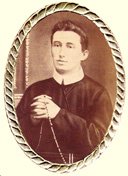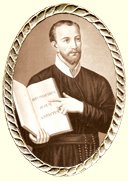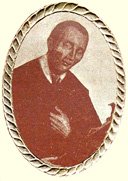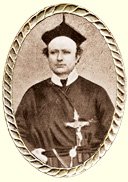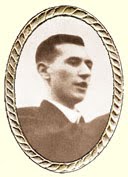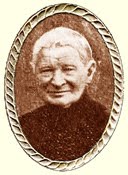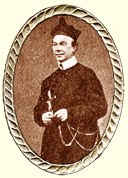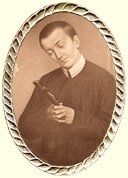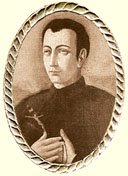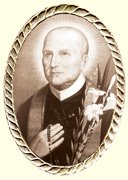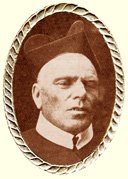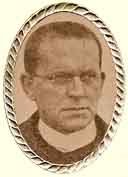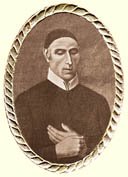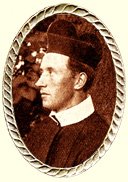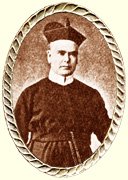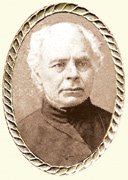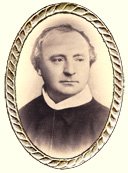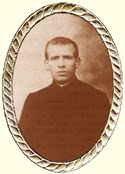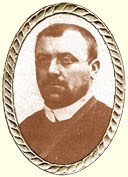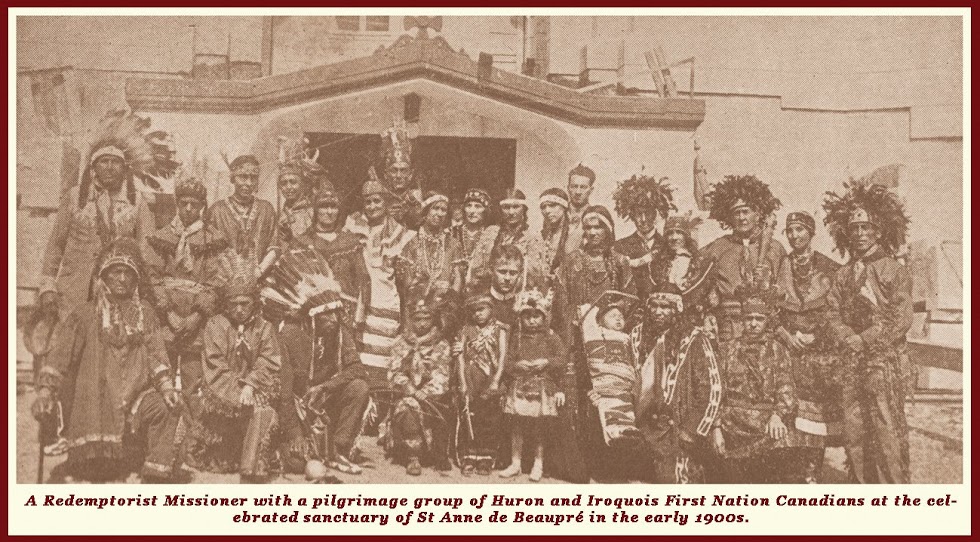The Servant of God Rev. Fr Angelo Latessa, C.SS.R. (1688-1755)
Our Father D. Angelo Latessa was born at Bisaccia, the ancient Romulia, on the 27th of August, 1688. His parents took the greatest pains with his education and as they could not find sufficiently good masters in his native town, they sent him betimes to Acerno to study literature under the direction of an excellent professor who resided there. As D. Angelo was filled with grace from his very childhood, he never allowed his studies to interfere with progress in virtue; he selected D. Horace Sansoni, the archdeacon of the cathedral, as his director, who was a man of rare piety, and he made it a rule never to deviate in the least from any of his councils. D. Angelo remained six years at Acerno, and made still more progress in the science of the saints than in earthly lore and literature. He was devoted to prayer and meditation, he abhorred idleness, and shunned all intercourse with the world. His chamber, study, and the church comprised the history of his life.
When he returned to Bisaccia, he resolved to embrace the ecclesiastical state, and he therefore devoted himself to theological studies with all possible diligence. He wished to be ordained sub-deacon at the age of twenty-one; but as Mgr. Galliani, his bishop, was very scrupulous in admitting young clerics to holy orders, he would not then give his consent. D. Angelo bore the delay with resignation, and from this time he led a still more secluded life than before; he abstained from all kind of society and amusements, devoted himself to study and the frequentation of the sacraments. After Mgr. Galliani’s death, his successor, Mgr. Mastellone, perceived the indisputable signs of a true vocation in the young Latessa, he therefore conferred holy orders on him, and ordained him a priest at the age of twenty-six.
At this time D. Gaetan Julian, a famous missionary and a great servant of God, retired to Bisaccia at the end of a life of labour in the work of the ministry; this priest was the worthy disciple of the venerable Father D. Anthony de Torris of the Congregation of Pious Workmen. D. Angelo immediately chose him for his director, and he grew so attached to him, that he remained under his guidance for thirty years. As D. Julian wished to give up all thoughts of everything but God and his own soul, he had no sooner returned to Bisaccia, his native country, than he retired into a solitary spot, where he could live apart from all his relations and friends, and as he had not provided any one to attend to his wants, D. Angelo undertook to do all he might require, and his affection for D. Julian was so great that he waited on him more like a servant than a son. If he went to his room, and D. Julian was busy or absorbed in his meditations, which generally lasted for three or four hours, or if he had not heard his knock, D. Angelo would remain quietly at the door until D. Julian happened to open it. He had all the food required prepared at his own house, and carried it to him every morning and evening. As D. Julian did not have a fire in winter, he four times a day carried some hot coals in a foot-warmer to him. There are persons now living in Bisaccia who remember having often seen him waiting with angelic tranquility and admirable patience as if he were a beggar at D. Julian’s door until he was ready to open it.
As Mgr. Mastellone had a high opinion D. Angelo’s virtue, he made him canon of the cathedral of Bisaccia in the year 1768. As he was an enemy to everything like pomp and ambition, he would not accept this dignity without the permission of his director, and as he did not think it right to grant it to him, D. Angelo at once declined the proffered honour, and when he was pressed to accept it by the bishop and by his parents, he secretly fled to Nusco where he hid himself until he heard that the canonry had been conferred on some one else.
His uncle, D. Joseph Latessa, passed into a better life in the year 1722, and his Lordship elected D. Angelo to succeed him, and this time he accepted the honour on the advice of his director Father Julian. No one at Bisaccia felt inclined to murmur at the selection, and D. Angelo fully answered the high expectations which all good people entertained in his regard. His disinterestedness was a subject of edification to all. He observed the canonical laws most rigidly; and he divided the revenues of his canonry into three equal parts, the first of which served for his own maintenance, the second for that of the church, and the third he distributed among the poor. His affection for them was so great that they were in the habit of calling him their father, and he was always surrounded by them both at the church and elsewhere.
He had been canon for twelve years, when Father D. Gaetan Julian died in the year 1734. He had nominated D. Angelo as his successor in a chapel built in honour of St Michael, which he had erected into a benefice: D. Angelo was quite satisfied with this arrangement, and resigned his canonry to his brother, that he might thus be able to labour for the glory of God and the salvation of his neighbour with more facility.
After Mgr. Manerbe was elected bishop of St. Angelo and of Bisaccia, he determined to found a seminary in his diocese, of which D. Angelo was nominated president. The first thing which occupied his attention, after he had been compelled to accept this office, was to establish a spirit of charity among the students, and to make them look upon themselves as being all sons of the same mother. He carefully abolished the use of the words mine and thine, and he wished that each of them should share what he received amongst each other so that they might thus mutually assist each other as if they were really brothers, and he once gave a severe punishment to a seminarist who would not share his portion of chocolate with another. He carefully established the frequentation of the sacraments, he excited all his pupils to the love of meditation, and led them to mortify their senses and passions; and we learn from the testimony of D. Salvadore d’ Andrea, the grand-vicar of Nusco, that the young men confided to his care were distinguished for their great piety, in which they were animated by the example of their superior, whose holiness was made manifest to them by God in a striking manner in more than one occasion.
One evening when he was visiting the different rooms, he perceived that a seminarist had taken off his stockings before the light was put out. As a punishment for this slight indelicacy, he gave him several blows on the legs; and at the same instant, several other young men who had the same habit, assert that they were struck in a similar manner, although they were not in the same room, and were perfectly ignorant of the correction inflicted on their companion.
The seminary of St. Angelo witnessed another prodigy which resembled the miracle of the multiplication of the loaves performed by our Blessed Saviour in the desert. One day D. Angelo wished to give the youngest boys a day of recreation in the country; he provided a little roll for each of them, and fruits and cheese in proportion; but when the two head classes heard of this treat they went to their good father, and said that they too were his children, and that it was not fair to deprive them of his favour. “Let all come then,” replied the father-president, “and God will provide for them.” They therefore took part in the county excursion. When they reached the end, D. Angelo blessed the bread and the rest of the provisions; they were then freely distributed among them all; yet there was not only enough to satisfy every one of them, but to their great astonishment, there was a great deal to spare. This fact has been attested on oath by the grand-vicar of Andrea.
D. Angelo ruled over the seminary for a year, after which he addressed such earnest supplications to the bishop, that although he was very reluctant to do so, he consented to allow him to return to Bisaccia that he might enjoy that peace and tranquility which were not to be found in the seminary.
We will now relate the mode of life which our Father D. Angelo pursued both at Bisaccia, and at the seminary of St. Angelo. He spent two hours in meditation in the morning, during which he remained prostrate and motionless, shedding torrents of tears; and in the evening he also spent two hours in the same manner, and he allowed nothing to interfere with this. He said mass in a devotional manner, but without being long; it was preceded by a preparation of half an hour, and he always made a long thanksgiving afterwards. He never ate meat or drank wine. His dinner consisted of a small portion of vegetables, and in the evening he only took some fruit or at most an egg. He used the discipline for some time every night with great severity, he always wore a rough hair-shirt, and often macerated his body with other instruments of penance, with which he did not dispense even when ill. The seminarists at St. Angelo discovered all this by looking through the crevices of his door. He never slept for more than four or five hours, and his bed was either the floor or a hard plank.
D. Angelo was thus crucified to himself and to the world, and lived in it as if he were separated from it. In imitation of his director D. Gaetan Julian, he too separated from his friends. At first he lived in a solitary cell, and then in two little rooms, which he added to his house to satisfy his brother, canon D. Vito, but no one ever visited him there except a little child, who regularly brought him a small portion of food, which was just enough to preserve life. His whole time was spent between his cell and the church. He did not even know where his own vineyard was situated, nor where the cattle were kept. He was never seen in any public place except when he accompanied the Blessed Sacrament or formed part of some procession; and when he went to church, he did so by the most obscure and unfrequented streets.
Although D. Angelo lived in such entire solitude, he had many and regular occupations. He daily instructed the country priests in ascetic theology and in morals; and he earnestly exhorted the young to labour for the glory of God and the salvation of souls. His house was a sort of academy of science and religion, and no one ever quitted it without being full of edification, and without having formed many pious designs. He had also a multitude of penitents, on whom he bestowed the most paternal care; he was particularly fond of being surrounded by the poor, who never wearied in listening to his pious exhortations and counsels. The sick and the dying were the objects of his predilection, and if they were poor he used to supply their bodily wants, for which purpose he procured delicacies from the convents in Calitri and Naples, which he kept by him to distribute among them. The dying, however, chiefly occupied his attention, and he neglected nothing which could tend to strengthen them at the hour of their terrible passage. When he was going to assist any of them, nothing could stop him. One night when he was summoned to the bedside of a dying man, an enormous wild boar ran before him, and prevented his passing; his companion was greatly alarmed, but D. Angelo manifested no emotion, and merely said, “It is an evil spirit who wishes to prevent my succouring this soul, but he will not succeed;” and he at the same time made the sign of the cross, upon which the monster instantly disappeared, and the servant of God was in time to succour the dying man in his last extremity.
D. Angelo possessed the most tender devotion towards the Archangel St. Michael which he inherited from his director D. Julian. Every year during the novena which precedes his feast, he withdrew entirely from the world, even from his spiritual children, and maintained a strict retreat, conversing only with God and his saintly patron. He neglected nothing by which he could honour the saintly archangel, and he spent all the revenues of his living in his honour and for the relief of the poor. In the year 1742, when the town of Bisaccia, was afflicted with a grievous scarcity, he gave a large alms to the poor in honour of his saintly guardian, as he was persuaded that this would be most pleasing to him. When he entered our congregation, he gave a lasting testimony of his devotion towards his angelic patron by erecting an altar in his honour in a chapel which he embellished with a magnificent pavement and various ornaments in stucco.
Extreme innocence in union with a spirit of penance were the distinctive characteristics of our Father D. Angelo’s life in the world. In recompense for this purity of heart God granted him dominion even over irrational creatures. One day when he was leaving the church with two priests, viz., D. Camillus Ferrarelli and D. Michael Arminio, who were both his penitents, he perceived two doves which were fighting and quarreling with each other on the tower of the castle. “Stop,” said he to the two young priests, “let us see if they will soon give over.” After he had looked at them for some time, he said to the doves, “Well, since you will not stop, you must both come down here”; and they instantly obeyed, and presented themselves before him; upon which he told Ferrarelli to catch them. “Go”, added he, “and carry them to that poor invalid who is confined to bed.” This one anecdote will suffice to show what an eminent degree of sanctity D. Angelo had attained, and how much he was favoured by God.
His was indeed too perfect a soul to be thrown away on an evil world, and so he was taken out of it that he might be brought to still greater perfection in the house of God. We have already said that Father Angelo highly approved of Father Margotta’s entering our congregation; soon afterwards he himself felt inspired to imitate him. He was too enlightened not to perceive the incontestable superiority of living under obedience to any mode of life in which one preserves one’s own will, that is to say, in which one keeps what is dearer to man than aught besides; he also readily acknowledged that one cannot render a more acceptable sacrifice to God than by giving up one’s whole being to Him, and thus resigning the tree to Him as well as its fruits. As our Fathers Cafaro and Sportelli happened to be giving a mission at Bisaccia at this time, he communicated his wishes to them, although he feared that his great age and many infirmities might prove an insurmountable obstacle to their accomplishment, but it was not so, for they both promised to speak to Father Alphonso in his favour, and owing to what Father Margotta said about him, he was so far from making any objection to receive him that he testified the greatest satisfaction in so doing; and although he did not dispense with his observance of rule, he granted him the privilege of making his noviciate privately in the house of Caposele under the direction of Father Mazzini; and he also promised that if he persevered, this time of trial should be abridged in his case by admitting him to make his profession before the usual time. “If he is not strong enough to labour for the public good,” said our Father Alphonso, “I shall be glad to have him in the house, for he will give edification to all who see him.” As soon as D. Angelo heard that he was to be admitted amongst us, he hastened to leave Bisaccia, at which the citizens were quite inconsolable, and he reached Caposele at the end of the year 1751, when he was in the sixty-fourth year of his age.
He put on the habit of a novice on the 3rd of the following month, which was the feast of Whitsunday. The first, or rather the only lesson he received from Father Mazzini was, that he must entirely abandon his former mode of life, and embrace that of the congregation in every particular; he said that he must sleep when he perhaps might desire to watch, that he must talk in spite of his love of being always in a state of silence and meditation, and that he might sometimes have to eat when it was positively repulsive to him to do so. D. Angelo did not require to have this admonition repeated a second time; he never looked back to what he had done, for he devoted himself to simple obedience and entire compliance with the will of his superiors. From the day he entered, he evinced the most admirable simplicity and unexampled humility, joined to holy ardour, to increase more and more in the paths of perfection.
Each stroke of the bell was to him as the voice of God. Although he was so old, he was the first to repair to the choir, and surpassed all the rest in the observance of the most trifling regulations. He looked upon the congregation as the entrance to heaven, and he said that if we knock at the gate of Paradise by a punctual compliance with rule, it will assuredly be opened to us. He humbly accused himself of what he called his faults at chapter, although they were in reality often acts of virtue; he deplored the years which he said he had wasted in the world, and felt a saintly envy for the young men who had entered the congregation in their youth. After this, however, he would give vent to a spirit of holy confidence. “Well,” he would say to the youthful clerics, “although I am such a poor creature, and although I have begun so late, I will overtake you and become a saint at last.”
When he returned to Bisaccia, he resolved to embrace the ecclesiastical state, and he therefore devoted himself to theological studies with all possible diligence. He wished to be ordained sub-deacon at the age of twenty-one; but as Mgr. Galliani, his bishop, was very scrupulous in admitting young clerics to holy orders, he would not then give his consent. D. Angelo bore the delay with resignation, and from this time he led a still more secluded life than before; he abstained from all kind of society and amusements, devoted himself to study and the frequentation of the sacraments. After Mgr. Galliani’s death, his successor, Mgr. Mastellone, perceived the indisputable signs of a true vocation in the young Latessa, he therefore conferred holy orders on him, and ordained him a priest at the age of twenty-six.
At this time D. Gaetan Julian, a famous missionary and a great servant of God, retired to Bisaccia at the end of a life of labour in the work of the ministry; this priest was the worthy disciple of the venerable Father D. Anthony de Torris of the Congregation of Pious Workmen. D. Angelo immediately chose him for his director, and he grew so attached to him, that he remained under his guidance for thirty years. As D. Julian wished to give up all thoughts of everything but God and his own soul, he had no sooner returned to Bisaccia, his native country, than he retired into a solitary spot, where he could live apart from all his relations and friends, and as he had not provided any one to attend to his wants, D. Angelo undertook to do all he might require, and his affection for D. Julian was so great that he waited on him more like a servant than a son. If he went to his room, and D. Julian was busy or absorbed in his meditations, which generally lasted for three or four hours, or if he had not heard his knock, D. Angelo would remain quietly at the door until D. Julian happened to open it. He had all the food required prepared at his own house, and carried it to him every morning and evening. As D. Julian did not have a fire in winter, he four times a day carried some hot coals in a foot-warmer to him. There are persons now living in Bisaccia who remember having often seen him waiting with angelic tranquility and admirable patience as if he were a beggar at D. Julian’s door until he was ready to open it.
As Mgr. Mastellone had a high opinion D. Angelo’s virtue, he made him canon of the cathedral of Bisaccia in the year 1768. As he was an enemy to everything like pomp and ambition, he would not accept this dignity without the permission of his director, and as he did not think it right to grant it to him, D. Angelo at once declined the proffered honour, and when he was pressed to accept it by the bishop and by his parents, he secretly fled to Nusco where he hid himself until he heard that the canonry had been conferred on some one else.
His uncle, D. Joseph Latessa, passed into a better life in the year 1722, and his Lordship elected D. Angelo to succeed him, and this time he accepted the honour on the advice of his director Father Julian. No one at Bisaccia felt inclined to murmur at the selection, and D. Angelo fully answered the high expectations which all good people entertained in his regard. His disinterestedness was a subject of edification to all. He observed the canonical laws most rigidly; and he divided the revenues of his canonry into three equal parts, the first of which served for his own maintenance, the second for that of the church, and the third he distributed among the poor. His affection for them was so great that they were in the habit of calling him their father, and he was always surrounded by them both at the church and elsewhere.
He had been canon for twelve years, when Father D. Gaetan Julian died in the year 1734. He had nominated D. Angelo as his successor in a chapel built in honour of St Michael, which he had erected into a benefice: D. Angelo was quite satisfied with this arrangement, and resigned his canonry to his brother, that he might thus be able to labour for the glory of God and the salvation of his neighbour with more facility.
After Mgr. Manerbe was elected bishop of St. Angelo and of Bisaccia, he determined to found a seminary in his diocese, of which D. Angelo was nominated president. The first thing which occupied his attention, after he had been compelled to accept this office, was to establish a spirit of charity among the students, and to make them look upon themselves as being all sons of the same mother. He carefully abolished the use of the words mine and thine, and he wished that each of them should share what he received amongst each other so that they might thus mutually assist each other as if they were really brothers, and he once gave a severe punishment to a seminarist who would not share his portion of chocolate with another. He carefully established the frequentation of the sacraments, he excited all his pupils to the love of meditation, and led them to mortify their senses and passions; and we learn from the testimony of D. Salvadore d’ Andrea, the grand-vicar of Nusco, that the young men confided to his care were distinguished for their great piety, in which they were animated by the example of their superior, whose holiness was made manifest to them by God in a striking manner in more than one occasion.
One evening when he was visiting the different rooms, he perceived that a seminarist had taken off his stockings before the light was put out. As a punishment for this slight indelicacy, he gave him several blows on the legs; and at the same instant, several other young men who had the same habit, assert that they were struck in a similar manner, although they were not in the same room, and were perfectly ignorant of the correction inflicted on their companion.
The seminary of St. Angelo witnessed another prodigy which resembled the miracle of the multiplication of the loaves performed by our Blessed Saviour in the desert. One day D. Angelo wished to give the youngest boys a day of recreation in the country; he provided a little roll for each of them, and fruits and cheese in proportion; but when the two head classes heard of this treat they went to their good father, and said that they too were his children, and that it was not fair to deprive them of his favour. “Let all come then,” replied the father-president, “and God will provide for them.” They therefore took part in the county excursion. When they reached the end, D. Angelo blessed the bread and the rest of the provisions; they were then freely distributed among them all; yet there was not only enough to satisfy every one of them, but to their great astonishment, there was a great deal to spare. This fact has been attested on oath by the grand-vicar of Andrea.
D. Angelo ruled over the seminary for a year, after which he addressed such earnest supplications to the bishop, that although he was very reluctant to do so, he consented to allow him to return to Bisaccia that he might enjoy that peace and tranquility which were not to be found in the seminary.
We will now relate the mode of life which our Father D. Angelo pursued both at Bisaccia, and at the seminary of St. Angelo. He spent two hours in meditation in the morning, during which he remained prostrate and motionless, shedding torrents of tears; and in the evening he also spent two hours in the same manner, and he allowed nothing to interfere with this. He said mass in a devotional manner, but without being long; it was preceded by a preparation of half an hour, and he always made a long thanksgiving afterwards. He never ate meat or drank wine. His dinner consisted of a small portion of vegetables, and in the evening he only took some fruit or at most an egg. He used the discipline for some time every night with great severity, he always wore a rough hair-shirt, and often macerated his body with other instruments of penance, with which he did not dispense even when ill. The seminarists at St. Angelo discovered all this by looking through the crevices of his door. He never slept for more than four or five hours, and his bed was either the floor or a hard plank.
D. Angelo was thus crucified to himself and to the world, and lived in it as if he were separated from it. In imitation of his director D. Gaetan Julian, he too separated from his friends. At first he lived in a solitary cell, and then in two little rooms, which he added to his house to satisfy his brother, canon D. Vito, but no one ever visited him there except a little child, who regularly brought him a small portion of food, which was just enough to preserve life. His whole time was spent between his cell and the church. He did not even know where his own vineyard was situated, nor where the cattle were kept. He was never seen in any public place except when he accompanied the Blessed Sacrament or formed part of some procession; and when he went to church, he did so by the most obscure and unfrequented streets.
Although D. Angelo lived in such entire solitude, he had many and regular occupations. He daily instructed the country priests in ascetic theology and in morals; and he earnestly exhorted the young to labour for the glory of God and the salvation of souls. His house was a sort of academy of science and religion, and no one ever quitted it without being full of edification, and without having formed many pious designs. He had also a multitude of penitents, on whom he bestowed the most paternal care; he was particularly fond of being surrounded by the poor, who never wearied in listening to his pious exhortations and counsels. The sick and the dying were the objects of his predilection, and if they were poor he used to supply their bodily wants, for which purpose he procured delicacies from the convents in Calitri and Naples, which he kept by him to distribute among them. The dying, however, chiefly occupied his attention, and he neglected nothing which could tend to strengthen them at the hour of their terrible passage. When he was going to assist any of them, nothing could stop him. One night when he was summoned to the bedside of a dying man, an enormous wild boar ran before him, and prevented his passing; his companion was greatly alarmed, but D. Angelo manifested no emotion, and merely said, “It is an evil spirit who wishes to prevent my succouring this soul, but he will not succeed;” and he at the same time made the sign of the cross, upon which the monster instantly disappeared, and the servant of God was in time to succour the dying man in his last extremity.
D. Angelo possessed the most tender devotion towards the Archangel St. Michael which he inherited from his director D. Julian. Every year during the novena which precedes his feast, he withdrew entirely from the world, even from his spiritual children, and maintained a strict retreat, conversing only with God and his saintly patron. He neglected nothing by which he could honour the saintly archangel, and he spent all the revenues of his living in his honour and for the relief of the poor. In the year 1742, when the town of Bisaccia, was afflicted with a grievous scarcity, he gave a large alms to the poor in honour of his saintly guardian, as he was persuaded that this would be most pleasing to him. When he entered our congregation, he gave a lasting testimony of his devotion towards his angelic patron by erecting an altar in his honour in a chapel which he embellished with a magnificent pavement and various ornaments in stucco.
Extreme innocence in union with a spirit of penance were the distinctive characteristics of our Father D. Angelo’s life in the world. In recompense for this purity of heart God granted him dominion even over irrational creatures. One day when he was leaving the church with two priests, viz., D. Camillus Ferrarelli and D. Michael Arminio, who were both his penitents, he perceived two doves which were fighting and quarreling with each other on the tower of the castle. “Stop,” said he to the two young priests, “let us see if they will soon give over.” After he had looked at them for some time, he said to the doves, “Well, since you will not stop, you must both come down here”; and they instantly obeyed, and presented themselves before him; upon which he told Ferrarelli to catch them. “Go”, added he, “and carry them to that poor invalid who is confined to bed.” This one anecdote will suffice to show what an eminent degree of sanctity D. Angelo had attained, and how much he was favoured by God.
His was indeed too perfect a soul to be thrown away on an evil world, and so he was taken out of it that he might be brought to still greater perfection in the house of God. We have already said that Father Angelo highly approved of Father Margotta’s entering our congregation; soon afterwards he himself felt inspired to imitate him. He was too enlightened not to perceive the incontestable superiority of living under obedience to any mode of life in which one preserves one’s own will, that is to say, in which one keeps what is dearer to man than aught besides; he also readily acknowledged that one cannot render a more acceptable sacrifice to God than by giving up one’s whole being to Him, and thus resigning the tree to Him as well as its fruits. As our Fathers Cafaro and Sportelli happened to be giving a mission at Bisaccia at this time, he communicated his wishes to them, although he feared that his great age and many infirmities might prove an insurmountable obstacle to their accomplishment, but it was not so, for they both promised to speak to Father Alphonso in his favour, and owing to what Father Margotta said about him, he was so far from making any objection to receive him that he testified the greatest satisfaction in so doing; and although he did not dispense with his observance of rule, he granted him the privilege of making his noviciate privately in the house of Caposele under the direction of Father Mazzini; and he also promised that if he persevered, this time of trial should be abridged in his case by admitting him to make his profession before the usual time. “If he is not strong enough to labour for the public good,” said our Father Alphonso, “I shall be glad to have him in the house, for he will give edification to all who see him.” As soon as D. Angelo heard that he was to be admitted amongst us, he hastened to leave Bisaccia, at which the citizens were quite inconsolable, and he reached Caposele at the end of the year 1751, when he was in the sixty-fourth year of his age.
He put on the habit of a novice on the 3rd of the following month, which was the feast of Whitsunday. The first, or rather the only lesson he received from Father Mazzini was, that he must entirely abandon his former mode of life, and embrace that of the congregation in every particular; he said that he must sleep when he perhaps might desire to watch, that he must talk in spite of his love of being always in a state of silence and meditation, and that he might sometimes have to eat when it was positively repulsive to him to do so. D. Angelo did not require to have this admonition repeated a second time; he never looked back to what he had done, for he devoted himself to simple obedience and entire compliance with the will of his superiors. From the day he entered, he evinced the most admirable simplicity and unexampled humility, joined to holy ardour, to increase more and more in the paths of perfection.
Each stroke of the bell was to him as the voice of God. Although he was so old, he was the first to repair to the choir, and surpassed all the rest in the observance of the most trifling regulations. He looked upon the congregation as the entrance to heaven, and he said that if we knock at the gate of Paradise by a punctual compliance with rule, it will assuredly be opened to us. He humbly accused himself of what he called his faults at chapter, although they were in reality often acts of virtue; he deplored the years which he said he had wasted in the world, and felt a saintly envy for the young men who had entered the congregation in their youth. After this, however, he would give vent to a spirit of holy confidence. “Well,” he would say to the youthful clerics, “although I am such a poor creature, and although I have begun so late, I will overtake you and become a saint at last.”
A soon as he became a novice, he hastened to thank Father Alphonso for such a great favour. “As I am unable to thank you worthily for such a great boon,” he wrote to him, “I will, notwithstanding my great unworthiness, say mass tomorrow in thanksgiving for your fatherly goodness. I shall thus perform the debt of gratitude I owe you, and I shall also almost compel you to pray for me, a poor sinner, who is already on the brink of eternity. I trust that I shall be able by the aid of your prayers to persevere in the state to which God and your Reverence have called me. In conclusion, I respectfully ask your blessing, and humbly cast myself at your feet,” etc.
As he wished to live like a true novice, he begged to their directory, and it was given to him. After this he was most prompt in complying with all the regulations, especially in going to the kitchen to wash the dishes. He once broke a plate; he instantly ran to the superior with a piece of it hung round his neck to ask for a penance. He used to offer to assist the cook in preparing the soup, and he was equally ready to tender his services to the brother who had the care of the refectory, to clear the table and wash up the plates and dishes. While he was a novice he had the care of the altar, and he used to go and gather the flowers to adorn it with himself; he arranged them in the vases with his own hands, and then devoutly offered them to Jesus in the adorable sacrament. He thus conformed to all that is prescribed in the directory; indeed, had he not been dissuaded from it he would even have learnt all the catechism of Bellarmine by heart. He delighted in the retreat which is made among us every Friday, and not only obeyed the least sign from Father Mazzini, but also that of any one ordered him to do anything whatsoever.
As he was well known in that neighborhood, all who came to the house were filled with admiration at seeing such a venerable old man become as a little child. When the time of the Jubilee came, Father Margotta thought that he ought to be exempt from going to Caposele with the others on account of his many infirmities, but D. Angelo was so anxious to gain indulgences, that he persuaded him to allow him to accompany the procession, and to join in singing the litanies, and his mere presence in the town had all the effect of a sermon. Someone compassionated him for the fatigue it must have caused him, but he replied, “Nothing is to be gained without suffering.” As the devil was envious of his goodness and happiness, he did all he could to disturb his tranquility. He represented to him how hard it was to be obliged to give up all the holy practices he had hitherto observed, but this temptation failed, for he was too well rooted in virtue to regret his former mode of life; he succeeded however in disturbing his mind, by reminding him of all the good which remained to be done in his native country. The tempter then assumed the guise of an angel of light, and set before him all that he had done in the world, and contrasted it with the little he seemed to be doing in the congregation, and strove to persuade him that he had embraced an easy and comfortable way of living in exchange for one of austerity and mortification. He reminded him of all the young priests he had instructed, and whose zeal he had excited, of the clerics he had directed in the paths of virtue, and of the numerous penitents to whom his counsels had been of such utility. He also depicted before him the dangers which so many poor creatures were exposed to now that they were deprived of his assistance. This temptation affected him most deeply of all, and when he began to meditate, instead of being united to God, it seemed to him as if He rejected him as a punishment for the error he had committed in entering the congregation.
When D. Angelo was thus tossed about by the waves of temptation, he wisely distrusted his own judgment. He went to Father Mazzini and with all humility manifested all that had passed within him; and this openness was so pleasing to God that he immediately recovered his peace of mind; and he used afterwards to tell our young men that a temptation is at least half vanquished after it has been made known to superiors, who hold the place of God in our regard. Another trial however awaited him. Scarcely four months had elapsed since his arrival at Caposele ere he was attacked by a malignant fever. He did not manifest any fear of death, even when the malady was at its height, but he evinced the most anxious desire to receive Extreme Unction. As he went on urging to have it administered to him, Father Margotta at length said, “I forbid you even to speak of Extreme Unction.” This answer quite distressed D. Angelo, and he said to his doctor, “I have been in the habit of receiving this sacrament spiritually every evening, and now I run the risk of being deprived of it at the hour of my death.” However, as his malady made rapid progress and his life was soon despaired of, it was at length granted to him. When he was on the point of receiving this sacrament he entreated with many tears that he might be allowed to unite himself to God by pronouncing the vows, and that thus a crowning favour might be put to the numerous ones he had already received from God and from the congregation. His request was granted, and after he had received this great happiness, he did nothing but sigh for the moment when he would be delivered from the prison of the body, and kept repeating with the apostle, “Cupio dissolve et esse cum Christo.”
When our saintly Father Alphonso heard of the state Father D. Angelo was in, he said, “He will not die; God will leave him amongst us for His greater glory.” He at the same time let him know that he must get rid of the fever, and only think of recovery. This confidence on the part of our holy father gave us all the greatest consolation. No sooner had Father Margotta received this message then he went to the bedside of the sufferer, and said to him, Father Latessa, our father-rector puts you under obedience to recover, and says that you must not think anymore about dying.” This command threw Father Angelo into the greatest perplexity, for he was agitated by the desire to die on the one hand, and by the fear of disobedience on the other. “Well,” said his Dr. Santorelli to him during this dilemma, “how will you be able to reconcile your wish to die with the command of your father-rector?” “There is but one course for me,” replied the sick man; “I must obey.” And immediately the fever and all the other bad symptoms disappeared. During his illness, which lasted six weeks he received daily visits from priests, gentlemen and religious. “Let us go,” said they, “and see how saints die.” He daily received Holy Communion by way of viaticum or devotion; when he was recovering it pained him so much to receive the Blessed Eucharist in his room that he begged to be assisted in dragging himself to the church. It was indeed a touching thing to see this venerable old man going daily to the choir to receive Holy Communion, supported by one of our coadjutor brothers. One day he fancied he was strong enough to celebrate Mass, and he sent a message to Father Margotta to ask leave to do so. He was afraid to allow him to make the attempt, but the messenger misunderstood him, and gave a wrong reply to Father Angelo. He therefore said Mass, although he did so with the greatest difficulty, and returned to his room quite satisfied. When Father Margotta heard of it, he went to him and gave him a severe reprimand. “If you choose to put me in prison,” replied D. Angelo, “I know I have quite deserved it, but indeed I did not know that I was disobeying you.” The correction was too severe, and so Father Margotta laughed and said to Father Gazzili, “See how penitent he is!”
When D. Angelo recovered, he sent our Father Alphonso a letter full of thanks for all the favours he had received from him. “Most Reverend Father,” said he, “would that God would vouchsafe that miracle in my regard which was desired so ardently by holy Job, and that He would engrave all the benefits I have received from your exceeding charity in enduring characters in my heart so that they might be always present to my mind during the remainder of my life and for all eternity; but if this cannot be, I wish at least to express my gratitude to you today with all possible humility and sincerity. I am especially thankful to you for having allowed me to become one of your children, for having shortened the noviciate, (with the consent of the other reverend fathers,) and for having put me under obedience to recover when I was dangerously ill. I thank you from the bottom of my heart, and I pray St. Michael, all the choirs of angels, and all the saints, and above all, our most blessed Mother, to reward you for all the signal benefits you have showered down on me. I entreat you, most Reverend Father, to bear me always in your heart, in union with Jesus and Mary, so that I may always remember your goodness to me and never cease to thank you for it; and I conclude by casting myself in spirit at your feet, and humbly ask your holy benediction, and am,” etc.
Father D. Angelo was far from being useless while he was in our house at Caposele; in fact, we may even say that he was its soul throughout the whole time he was there. At first he was entrusted with the duties of the confessional; when this was proposed to him, he said, “If I cannot give missions, nor preach, I will at least hear as many confessions as I can.” He was the first to go to the church, and he remained there to the latest moment. There is always a good deal to do in the confessional in our church at Caposele, for it is much frequented; but on the feast days especially Father D. Angelo’s zeal was fully exercised, and he was unable to leave it until long after noon.
When the spiritual exercises were given in the house, he was of immense assistance in hearing confessions, and his ardour was redoubled when he had to do with young candidates for the priesthood. He was however at all times ready to attend to those who came to consult him about their spiritual concerns, and as he had been enjoined to receive such persons, he took pleasure in going with them, and used to take pains to amuse them during recreation.
The Congregation of Artisans was also confided to his care, and at that time it contained three hundred members. He made the most zealous efforts to increase their number and to augment their fervour; he gladly heard the confessions of the associates, addresses very salutary exhortations to them, and never dismissed them without having added fresh ardour to their piety.
Besides this, he was also perfect to our coadjutor brothers, to whom he used to give regular instructions on the holy mysteries of our religion; he heard the confessions of almost all of them, and unceasingly urged them to love Jesus Christ and to be devout to His blessed mother.
During mission times, when the rector was always absent, he was left in the house almost alone; and then the poor old man was obliged to act as superior. He showed the greatest anxiety for the exact observance of rule on these occasions; he carefully watched over the brothers, and was unwearied in striving to maintain good order. It was not easily passed over if any one arrived too late for any common exercise, or who performed any duty in a negligent manner. When Saturday came round, on which day we accuse ourselves of faults against rule in full chapter, he set forth the gravity of the most trifling breaches of observance, and he was not satisfied if the offender did not make the most sincere resolutions to avoid them for the future; if he therefore relapsed into the same fault again, he gave him a very severe reproof and penance on the following Saturday.
His own conduct was so exemplary that it at all times afforded matter of edification to his brothers. He never absented himself from attendance at the exercises of the community; he was the first to repair to the choir in morning, even during the severest weather in winter. He was sometimes told that the click which awakened the rest of the community was not intended for him, and he would immediately answer, “I am very well, therefore why should I require any exemptions, and not join the rest that I may share in their privileges.”
He did not confine himself to the meditations prescribed by the rule, and although he was at all times recollected and never lost sight of the presence of God, he also consecrated every spare moment to this holy exercise. He passed the day of monthly retreat in entire silence, and generally spent it in a retired corner of the church, and he never omitted to make the spiritual exercises once a year as prescribed by the rule; and he performed them with so much recollection and with such a spirit of retreat that no one could help admiring him who saw him. In fact, his whole life was a constant union with God, and all his features betokened one whose days were spent in walking in the hidden paths of the interior life. Even during recreation, he only liked to speak of God, or silently to listen to what others said regarding Him. His public mass was rather quick, but this was only because he was afraid of being tedious to the people, for it was quite the reverse when he celebrated in our private chapel. And when he did so, the father-rector and D. Angelo served each other’s masses by turns.
Father Angelo had the most tender devotion to the Incarnation of Jesus Christ; he meditated on all the mysteries it contains, and when he did so he shed many tears; indeed this gift was habitual to him. One Christmas night, when the choir sung the words, “Christus natus est nobis,” he burst forth into so many tears and sobs that every one present was deeply affected. He used to meditate on the mysteries of the Blessed Virgin in like manner, and he fasted on bread and water on all the eves of her feasts. “The Madonna,” he often said, “is worthy of every homage, and we can never honour her sufficiently.”
The love of God and of his neighbor had equal sway over his heart, and he used to say, “He who does not love charity is not a true son of our congregation.” There was no distinction of persons with him; those in suffering were always the special objects of his tenderness, whatever might be their rank in life: the poorest labourer who was afflicted with sickness was sure to be treated by him with the most paternal care.
His nephew was attacked by a deadly malady, which lasted for a whole month, during which he never left him day or night. When he was advised to take some rest, and to think a little about his own health, “I am bound to do what I do through gratitude,” he replied; “for he took the same care of me when I was dangerously ill.”
His hatred towards himself was as great as his love towards his neighbour. He never omitted to mortify his senses, and if he could not obtain leave to abandon himself to all his fervour would have led him to desire, he managed to obtain permission for a good deal from the father-rector, who was his director. He kept Wednesdays, Fridays, and Saturdays as days of abstinence, and he never took even the small quantity of wine which is made use of in the community. Although he had a painful hernia, he used often to eat either on his knees or prostrate on the floor, and he generally mingled bitter herbs with his food. He took the discipline every day, and he used it twice on the days when it is enjoined by the rule. Up to the hour of his death he always wore iron chains round his arms and legs at least three times a week, and he increased these austerities during novenas to Jesus Christ and to the Blessed Virgin. He would have liked to do far more than this, but his director restrained his zeal, as he very reasonably was afraid of his undertaking penances which would have been beyond his strength.
On the 2nd of August, 1755, the Octave of the Porziuncula was commenced in the church of the Conventual Fathers, and D. Angelo eagerly accompanied the father-rector thither in order to gain the indulgences. It is a tedious and toilsome journey, for if the descent is most fatiguing, the ascent is still more painful; yet D. Angelo did not hesitate to undertake it, notwithstanding his many infirmities, but the next day he was unable to leave his bed, whether in consequence of this unfortunate expedition, or through some other cause, we cannot however determine. His illness was a tedious one, for it lasted more than two months. He said mass on the 6th of August for the last time. “What did Jesus Christ say to you this morning?” asked D. Santorelli. “We took leave of each other,” replied D. Angelo; “I said to him, ‘This is the last sacrifice which I entreat Thee to offer to Thine Eternal Father for me, for we shall meet no more at the altar.”
He received Holy Communion throughout his illness in his own room; he prepared for it with torrents of tears, and his thanksgiving resembled his preparation. He was absorbed in contemplating the goodness of God, and unless when he was interrupted by the doctor or by one of us, he would remain in prayer from morning until night.
When it became noised abroad that he was ill, every one hastened to come and see him, from the wish to hear his salutary counsels once more. This concourse of strangers was very painful to the humble D. Angelo, but he received them all with kindness, and thanked them for their kind feeling towards him. His mere appearance edified all who saw him, and the words of life which issued from his lips made the most lively impression on every heart. He set the magnitude of their obligations before the priests and religious who came to see him in such a forcible manner that they went away penetrated with a holy fear. When asked how he was he simply replied, “I am doing the will of God.”
His daily anxiety to communicate seemed such a contradiction to his apparent indifference about receiving Extreme Unction, which he did not even name, that his confidential friend, D. Santorelli, could not help saying to him, “How is it that you have never spoken of Extreme Unction since you were put under obedience not to die?” “I will do so when the time comes,” he replied. And on the morning of the 3rd of October, 1755, he sent for Father Cajone, the rector of the house, and said, “My father, it is now time to give me Extreme Unction, that I may go and enjoy the presence of God, which I trust I shall do through the merits of my Blessed Saviour; I therefore entreat your Reverence to assist me in this extremity.” This proves that God had made known to him his last hour, for after he had received Extreme Unction, with the entire presence of mind and with the most tender piety, amid a crowd of priests and gentlemen, who melted into tears at the sight, he begged to be left alone, that he might prepare for his agony.
His strength began to fail at about six o’clock in the evening: before he entered into his agony he kissed his crucifix and bathed it in tears of devotion; then holding it with one hand while the other he embraced the father-rector, he gave up his pure spirit to God at eight o’clock, amidst the lamentations of all present. His death took place on the octave of the festival of St. Michael, the patron of the dying, for whom he always felt a special devotion. At the obsequies of Father Latessa it seemed as if a solemn fête and gala day were being held at Caposele, rather than a funeral ceremony. Father Cajone, who was at that time the superior of the house, invited the clergy, the chapter, and the Conventual Fathers to be present at the funeral. Many gentlemen and ladies of high degree were also present, and crowds of poor people also flocked thither, full of eagerness to obtain relics of Father Angelo. The body was placed in the church during the night before the ceremony. One of our coadjutor brothers in cutting off his hair inadvertently pierced the skin, and the blood flowed from this trifling wound in such quantities that all of his clothes were steeped in it, and we were obliged to tear them up and distribute the pieces among the faithful to gratify their devotion.
The virtues and merits which our Father D. Angelo Latessa possessed when he entered the congregation brought forth tenfold fruit and ripened into perfection ere he died. We may even confidently assert, that he entered into a blissful eternity without ever having sullied the robe of innocence with which he was clad in holy baptism; for all the fathers who had the direction of his conscience have attested that they never found even the shadow of deliberate venial sin in him. He was betrayed into owning to D. Santorelli, that the sin for which he felt he had most to reproach himself, and for which he humbled himself most deeply before God, was that he had once played at tennis with his companions whilst he was studying at Acerno. “But, by the grace of God,” he added in a spirit of profound humility, “I did not then wear the ecclesiastical dress.” On another occasion, when he was conversing familiarly with our Father D. Bernard Maria Apice, the latter laughingly said to him, “I have caught you this time, Father Angelo; you are not telling the truth.” “What,” he replied, almost weeping through horror at such an accusation, “I do not remember ever having told a willful falsehood since I was born, and can your Reverence think I would begin to lie at my present age?” Such were the innocence and candour of this good father, and yet, as we have already seen, he always felt bound to do penance and to practice the most constant austerity.
Our Brother Gerard Majella suddenly entered into an ecstasy eight days after his death in the middle of recreation, and exclaimed in a transport of joy, “Look at our blessed Father Latessa, he is just entering heaven!” When we narrate the life of this saintly brother, it will be seen what faith may be attached to his words, and if God could give us a more perfect assurance of the happiness which His faithful is now enjoying in heaven. †
(Typed by Miss Rebecca Marchand of the United States.)





















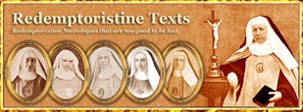
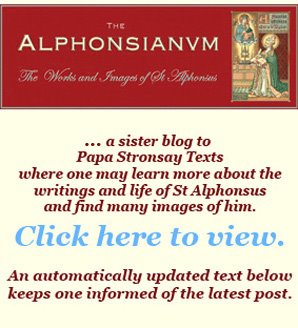.jpg)









